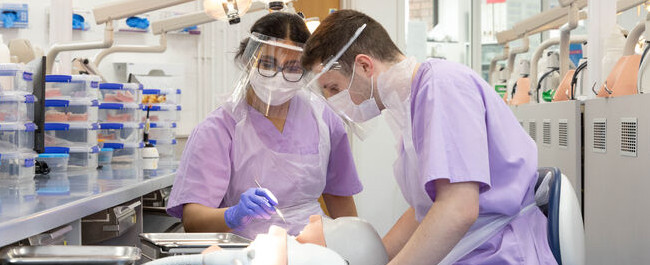Transforming clinical practice through the arts

A Bristol course is helping to reshape the professional development of clinicians by integrating humanities into medical training.
Research highlights:
- Transformed students’ perspectives on clinical practice.
- Enhanced doctor-patient relationships through greater empathy.
- Contributed to better patient care.
- Helped reduce burnout by fostering wellbeing among healthcare professionals.
Effective doctor-patient relationships often rest on the clinician’s ability to establish empathy and communicate effectively.
For over 10 years, Bristol’s Intercalated BA in Medical Humanities (iBAHM) has supported this need by helping to produce doctors who are more emotionally grounded, culturally aware and philosophically enquiring.
Breaking new ground
the first of its kind, the innovative programme offers medicine and dentistry students a one-year course run by the Departments of English and Philosophy.
Informed by longstanding Bristol research on how literature reflects and challenges approaches to medical practice, the course encourages students to move beyond an evidence-based medicine approach and consider the emotional, social and psychological aspects of illness. Courses such as ‘Literature and Medicine’, for instance, allow students to explore a range of literary-critical and cultural theories and the broader context of care, emphasising a patient-centred approach that is focused not only on curing but also caring for patients.
The teaching also focusses on the ways literature can inform medical practice by historicising disease categories, improving narrative competency and foregrounding communication skills and the importance of verbal expression in the clinical encounter.
Enhancing practice and doctor-patient relationships
The impact on students, many of whom are now practicing medical professionals, has been significant. A survey of iBAHM alumni revealed that 95% felt the program made them better doctors, while 100% said it changed their perspective on clinical practice.
Over 80% also reported that the course made them more caring toward patients and 73% said it increased their empathy. One student highlighted how the degree helped her become "comfortable in feeling uncomfortable," empowering her to manage difficult conversations and diagnoses with more confidence. Another confirmed that course allowed them to see their role as not just diagnosing and treating diseases, but as "seeing the person suffering from the disease."
Creativity and professional development
Creativity plays a crucial role in the iBAHM experience. Some graduates have integrated creative projects into their clinical practice, including a patient and staff poetry project displayed on wards. One former student remarked that the programme "nourished my soul", giving them the confidence to bring creative thinking into their professional lives.
Students have also Improved their communication and writing skills, reporting that the programme has improved their ability to write patient notes, referral letters literature reviews and academic papers. They say this skillset has directly impacted their careers, with 90% stating that the course increased their employability as clinicians.
Wellbeing and preventing burnout
Longer term it is hoped that iBAHM will also help prevent burnout among its graduates. The programme’s focus on reflection and wellbeing has equipped students with tools to cope with the emotional demands of the medical profession. Over 80% of alumni say that the iBAHM gave them confidence in their roles.
One student confirmed that the programme "fosters the ability to admit a few weaknesses or vulnerabilities" – a factor they say is crucial for maintaining mental health in what is often a very hard job.
The iBAHM programme not only prepares students to become better doctors – it helps them to redefine and reassess what it means to be a clinician in the modern world.
We welcome all intercalating medical, dental and vet students from the University of Bristol or other universities to apply for the intercalated BA Medical Humanities. Read more about the course.
One student highlighted how the degree helped her become ‘comfortable in feeling uncomfortable’, empowering her to manage difficult conversations and diagnoses with more confidence.
Connect with the researcher
Professor Ulrika Maude, Professor of Modern Literature, Department of English
Cite the research
Maude U (2015). Literature and Neurology, in Hillman D & Maude U (eds.) The Cambridge Companion to the Body in Literature, Cambridge University Press [Available on request]
Maude U (2018). Modernism, Neurology and the Invention of Psychoanalysis, in Maude U and Nixon M (eds.) The Bloomsbury Companion to Modernist Literature, Bloomsbury [Available on request]
Maude U (2019). ‘Que Voulez-vous?’ Beckett, Nerve Theory and Literary Form, in Rabaté JM (ed.) The New Samuel Beckett Studies, Cambridge University Press, pp.175-194